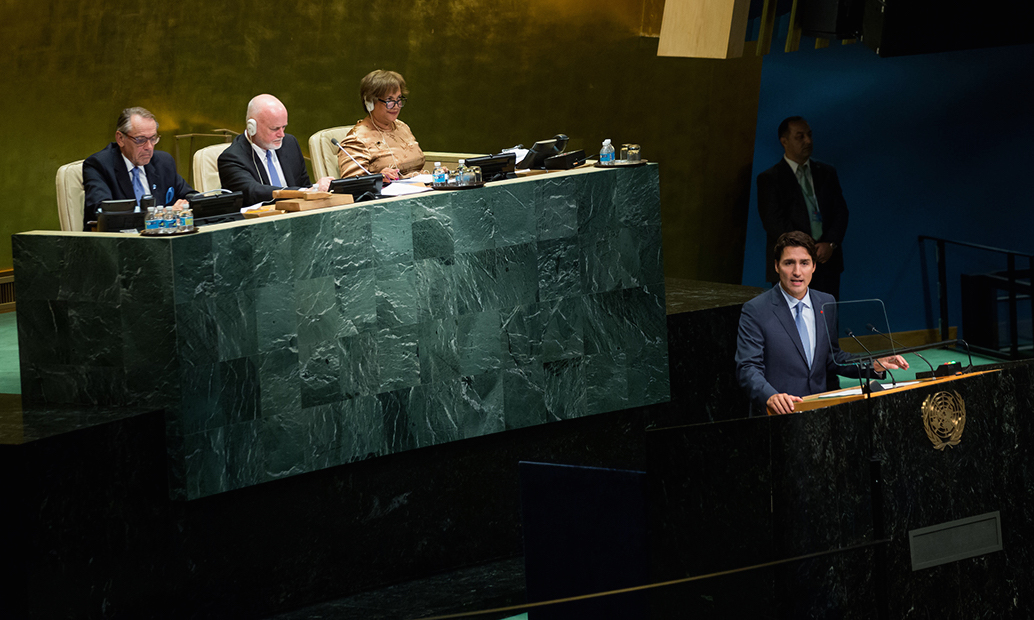The Justin Trudeau government came to power in 2015 promising “to restore Canadian leadership in the world” and to “make a real and valuable contribution to a more peaceful and prosperous world.”
Instead of building a peaceful world, Canada seeks prosperity like the Americans: through selling arms to Saudi Arabia — though many Canadians would prefer that Canada not help the Saudi Kingdom choke and annihilate women, men and children in Yemen.
Since the election of Brian Mulroney in 1984, successive governments have been carrying the American flag on major foreign policy issues to the point that few foreign observers expect more of Canada other than to echo more softly what is being said by the United States.
The 1988 Canada-U.S. Free Trade Agreement championed by Mulroney declared (in Article 102: Objectives: e) that the trade deal “lay the foundation for further bilateral and multilateral cooperation …”
In short, the idea that Canada could play a role in the world independent of the U.S. was set aside in favour of following the big neighbour approach to foreign policy.
With notable exceptions, such as the unwillingness of Quebecer Jean Chrétien to provide combat troops for the second U.S. invasion of Iraq, the pattern of subservience to American foreign policy has continued with little variation for 30 years. The Trudeau government shows little inclination to change matters.
Indeed, Team Trudeau reflects the continentalist outlook characteristic of the Liberal Party since Sir Wilfrid Laurier proposed free trade with the U.S. in 1911.
In 1963, writing in Cité Libre, Pierre Trudeau famously described then Liberal prime minister Lester (Mike) Pearson as the “defrocked prince of peace” for accepting American nuclear missiles on Canadian soil.
Showing proof of flexibility, two years later Trudeau was elected as a Liberal MP and became parliamentary secretary to Pearson.
In 1983-84, the last years of his political career, Trudeau undertook a personal peace mission, hoping to bring pressure on U.S. president Ronald Reagan and the Soviet leadership to reduce nuclear tensions.
Yet at home, in the face of opposition from peace groups, Trudeau was allowing the Americans to test cruise missiles over Canadian territory they had identified because it resembled the geography of the Soviet Union.
In 1989 the Berlin Wall went down, a remarkable event that pre-figured two others: the Soviet Bloc broke down; and the Soviet Union itself imploded.
The U.S. declared victory in the Cold War and identified itself as the sole super power. This opened a geopolitical contest with the Americans striving to keep other great powers such as Russia, China, or the EU from rivalling its military, financial, and economic supremacy.
As the post-Cold War hegemonic power, the U.S. no longer saw the need to cooperate closely with Canada and others in the liberal multilateral institutions it had fostered beginning before the end of the Second World War.
The World Bank and International Monetary Fund had their uses but were not allowed to exert any actions independent of the U.S. Treasury. The UN was left chronically underfunded by the U.S. Congress and generally ignored by U.S. presidents, except as a vehicle for denouncing the enemies of America: Iran, Iraq, and North Korea.
The Trump administration has been clear that it intends to use its one-on-one negotiating power to extract concessions from the European Union, Japan, China, and Russia, just as it has already done with Korea, Canada, and Mexico.
Recently, Canada invited some influential World Trade Organization (WTO) members (but not China or the U.S.) to talk in Ottawa about how to fix the organization, which the U.S. is disrupting by blocking the nominations of judges for the appellate body of its valued dispute settlement procedure.
Relaunching multilateral trade is an understandable objective. But the Trudeau government has not been clear if it is promoting the American perspective on what is wrong with the WTO or building an institution to protect world trade from the unilateral use of U.S. power.
If Justin Trudeau expects Canadians to respect his leadership abroad, he needs to define a Canadian role independent of U.S. domination on issues such as the UN Sustainable Development Goals, China, which is the object of a U.S. trade protectionism offensive, Russia, which remains a great power, and controversial regimes such as Iran or Venezuela.
Duncan Cameron is president emeritus of rabble.ca and writes a weekly column on politics and current affairs.
Photo: Adam Scotti/PMO
Help make rabble sustainable. Please consider supporting our work with a monthly donation. Support rabble.ca today for as little as $1 per month!




